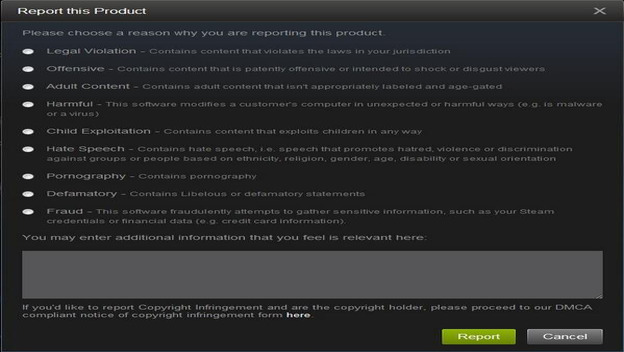It kind of feels like game publishing has come full circle. Back in the early days of game publishing, anyone could make any game they wanted. That’s why you saw so many blatant clones and rip-offs, and also why you saw weird games like Burger Time , or even porn games like Custer’s Revenge . You could basically get whatever you wanted published without anyone stopping you. Then, as video games became a more respected and professional medium, publishers started throwing their weight around and coming down hard on clones and unlicenced games. Now, in the world of indie-publishing and self-publishing, we are once again opening up the floodgates to games like Custer’s Revenge , for the sake of other indie masterpieces like FEZ . How will the current gaming atmosphere deal with the inevitable influx of self-published genetalia!? No one gaming company can police every self-published game, can they? Would it even be self-publishing at that point?
Valve has an idea. If content itself is going to be able to be published without restrictions, and that risks offending the user fan base, why not let that fan base police the content itself? Soon, Steam will be integrating controls that will allow you to report products for containing pornographic content, content that violates the law in your jurisdiction, content that is patently offensive or intended to shock or disgust viewers, content that installs harmful programs on your computer, content that contains child exploitation, content that contains hate speech, content that contains adult content that isn’t clearly labeled, content that contains libel or defamatory statements, and content that is blatantly fraudulent. When flagged, a product will then be reviewed by Valve and possibly taken off of the Steam library.
Of course, this does kind of open up a can of worms. For example, there are lots of horror games that are designed to purposefully shock audiences. Do these get flagged? What about child exploitation? Does Clementine’s portrayal in The Walking Dead count? It’s very subjective and is certainly only the beginning of a rating system. However, leveraging the power of the masses is certainly an interesting idea. At least we can all agree that we won’t want to see another Custer’s Revenge hit the Steam Library. Then again, this system only works to remove products after they have already been published. At that point, people will have already seen them and will have been offended. It’s less a preventative measure and more damage control.

What do you think? Will the open nature of self-publishing prove to be a problem for digital distribution platforms like Steam? Would you use this new rating system? If so, what sort of games do you not want to see on digital distribution platforms? Let us know in the comments and we will bring you more information about Steam’s self-publishing system as it becomes available.
